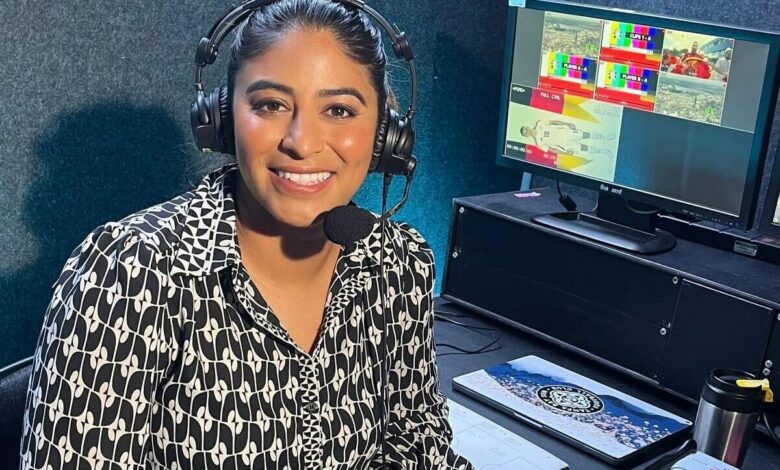Interview with Christina Unkel: Team Leader, Lawyer, App Creator and Star of the Euros Breakout

Follow today’s live coverage of England vs Netherlands in the semi-final of Euro 2024
The star of this summer’s European Championship only played her first match on Monday.
ITV referee analyst Christina Unkel speaks to The Athletics before heading off to the BBC media match in Berlin. First she will meet Jill Scott for coffee — one of the players she booked in her former life as an elite referee is now a colleague — and on Wednesday she will be on hand for coverage of England’s semi-final against the Netherlands. She has worked on all of ITV’s matches during the tournament, plus their highlights programmes.
It’s a wonder she finds the time. Unkel is also the president of the Tampa Bay Sun, a new team that will kick off its inaugural USL Super League season in August, a founder of fitness apps and a trial lawyer. She’s well known to American viewers, having appeared on Fox, CBS and Paramount Plus’ soccer coverage, but Euro 2024 marked her breakthrough in the U.K., and she’s drawn widespread praise for her calm authority.
The 37-year-old is an astute wit and her contributions have often provided some of the most compelling parts of ITV’s halftime and post-match coverage. Unkel is often challenged by pundits Gary Neville, Ian Wright, Roy Keane and Ange Postecoglou, who may be aware of football’s changing laws but still don’t like them all.
“That’s exactly why I did this in the first place,” she says. “I encourage them. Everyone says, ‘I feel like they’re beating you up.’ Not at all! Ask me questions! If they, as professional footballers, have a hard time with those questions, then the rest of the population has a hard time.
“If I just wanted to take a paycheck and walk away, I’d probably shudder. But those are the opportunities I want. Those are the conversations that IFAB (the International Football Association Board, the game’s lawmakers) perhaps need to hear from the football community.
“They have such a high level of football insight and sometimes they don’t even know – rightly so – some of the nuances that we have. You can look at the rules of the game, but the nuances or the application – what I call the case application – are not included.”
Unkel began her own refereeing career at age 10. She was the type of player who felt unfairly insulted by officials, to the point that her coach would tell her to be quiet or take a class and learn the rules. Treatment from referees was kinder when she came up—had that not happened, she says, she’s not sure she would have stayed in the sport—and when confronted with any kind of sexist abuse about returning to the kitchen, she brushed it off, wishing her opponents would come up with something more original.
Her main goal was to become the kind of official she wanted to meet as a player.
“As a female soccer player, people would be assigned to our games and not take it seriously or think they were no big deal,” she says. “For someone to not care about our game — because it was a girls’ game — drove me crazy. We still deserved fair treatment and quality and care and attention. Sometimes you just remember a referee for how well he did a job. I always wanted to be remembered for that.”
Unkel graduated from college and discovered that there was little infrastructure for women’s professional soccer in the United States. Playing abroad wasn’t an option when the pay was so poor. Refereeing was the best way to stay involved — even though the pay was so poor in the early days of her refereeing career that she would lose money if she quit her job.
Her goal was to get to the point where she could referee teams like the U.S. Women’s National Team. Those were the most exciting games of her career “because of the environment they created. I’m a referee and obviously no one’s going to come up to me except my parents, but you were part of that tapestry in some way.”

Christina Unkel, pictured in 2014, during her career as a referee on the field (Stanley Chou – FIFA/FIFA via Getty Images)
She took on her first television role for the 2019 Women’s World Cup, when she played 53 games for Fox Sports. She joined the day before Fox announced their line-up. It meant giving up her role on the FIFA panel and, having made that sacrifice, she was keen for her involvement to be about more than just criticising her former colleagues. That, she says, is why “this role is very taboo”, although the stigma is shifting.
“Not many people have done this role in the way I envisioned it, which is to educate the masses,” she says. “If the referee gets a decision right, break it down: this is the game, this is the law, this should have been the answer. It’s very rare that officials get something wrong just because it’s a gross misapplication of the law. That’s easy to explain without destroying an official. My job is not to judge the referee; my job is to explain the laws.
“When I took on that role, some people were shut out. Some friends of mine didn’t agree with it.” They came around when she was picked up by CBS for their Champions League coverage in 2020 and they were able to see what she was trying to do. This tournament has underlined that it’s valuable work.
“It was a bit illuminating for me to see so many people bashing the English referees, but they were actually some of the best performing officials in this tournament,” Unkel explained. “The aim is to enlighten people so that they make more informed opinions or decisions.”
At ITV, she has the benefit of a full-time video operator who helps her select clips for analysis; for domestic matches, she chooses the best angle herself. The pair treat their remote studio booth “like stepping into a VAR room” and it helps that Unkel was among the first batch of referees trained in VAR in 2017, with Howard Webb as her instructor.
That boot camp involved sitting in video ops booths with timers in the corner of the footage she watched. “After 10 or 15 seconds, it goes from green to yellow, and then it goes to red after, like, 30. So it feels like you’re in a spy movie that’s about to blow up.” It was good preparation for the three to five seconds she has in the game to explain decisions. “Sometimes I have to explain something I’ve learned in 20 years. What are the one or two really important things that you want people to take home with them so they can connect it really quickly without having to go through all the refereeing courses that I’ve gone through?
“You know what kind of checks are being reviewed. ‘Here’s what I need to look at, and here’s what I need to break it down.’ And once I have that answer, I’m always thinking, ‘Let me in! Let me in!’ If they bring me in before I have the answer, I’ll comment while I’m looking for it: ‘The VAR is looking for this specific angle that will be shown this.“I basically put the audience through the exact same mental protocol as they would in real life.”

One of the most controversial aspects of the tournament has been the semi-automatic offside ruling, made possible by extra cameras and limb-tracking technology, which has robbed Belgium’s Romelu Lukaku of three goals in his first two games.
“As a striker I will never be able to accept this kind of offside,” Wright said after Belgium’s 2-0 group stage win over Romania. Unkel went on to outline how certain players may need to adapt their running style to stay within the law. Spurs manager Postecoglou has also been critical of laws that now impose penalties for what would previously have been ignored. “I don’t think that’s the reason we’ve deployed technology,” he said.
“We’re still in that Goldilocks period of figuring out how we’re going to use our technology to improve the game,” Unkel says now. “Everybody hates offside. Players hate it. Referees hate it. Fans hate it. Coaches hate it.
“We see these toenail offsides because of the law and the technology that’s been given: the semi-automatic offsides and the lines that are falling. In Major League Soccer, even to this day, they can’t afford to have those lines falling. We haven’t had any problems with toenail offsides in Major League Soccer because when you use VAR in Major League Soccer, if it’s really close and you really can’t see it, you leave it like that. The goal stands. It stands like that and nobody’s upset about it. They were maybe off by an inch.
“While we are here know they’re off by an inch. And that’s what really frustrates people. I kind of laugh about it and make the case: competitors and leagues could save millions of dollars if they just got rid of the offside lines. The technology is really expensive. The important thing is that (in punditry) you now have someone who can say with the naked eye: does that make sense? Would that be reversed or not? How close is that?”

The news has exposed a gap between expectations of the technology and how it has worked in practice. Unkel is keen to stress that any change to the law is carefully considered and precise; debates at major European tournaments can speed up changes to the law, but it generally takes a few years for amendments to be approved. They go through technical and practical advisory boards, IFAB directors, FIFA representatives, players, coaches and confederations.
“If people say, ‘I didn’t expect that,’ you or someone on your coaching staff needs to focus on that because it affects how you line up for games or understand the implications,” Unkel said. “You can give your input before the request so we can better understand how it’s going to play out in the game, not after the fact.”
With Unkel hot on their heels, that could easily happen.
(Top photo: ITV)




